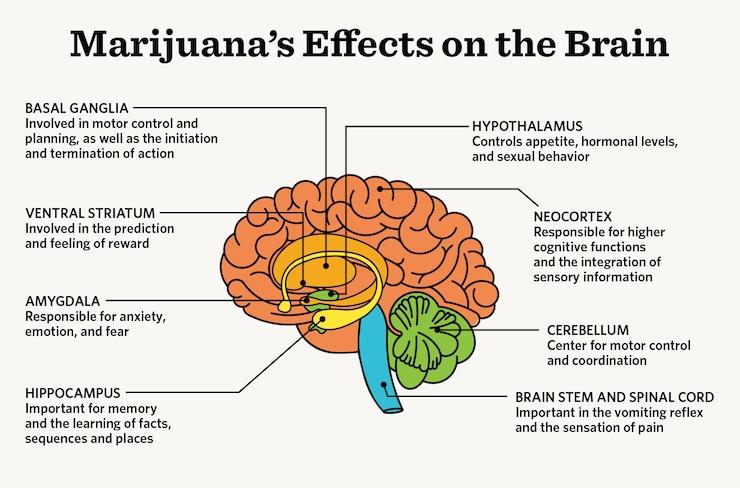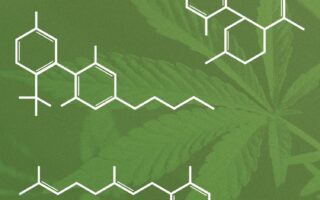In the vast tapestry of nature’s bounty, few compounds have sparked as much intrigue and conversation as tetrahydrocannabinol, commonly known as THC. Often synonymous with recreational use and the cultural milestones of the cannabis movement, THC extends its reach far beyond the realms of euphoria. As we navigate the complex landscape of cannabinoid science, it becomes essential to demystify this potent compound: What exactly does THC do within the human body, and how is it reshaping our understanding of wellness and medicine? In this exploration, we will delve into the multifaceted effects of THC, shedding light on its interactions with the endocannabinoid system, its therapeutic potential, and the broader implications it holds in today’s society. Join us as we unravel the complexities of THC—one molecule in a world that’s constantly evolving.
Table of Contents
- Understanding THC: Its Effects on the Mind and Body
- Exploring the Therapeutic Benefits of THC in Modern Medicine
- Navigating the Risks: Potential Side Effects of THC Consumption
- Guidelines for Responsible Use: Finding the Right Dosage and Methods
- Q&A
- Final Thoughts
Understanding THC: Its Effects on the Mind and Body
THC, or tetrahydrocannabinol, is the principal psychoactive component of cannabis. It interacts with the body’s endocannabinoid system, particularly binding to CB1 receptors found in the brain, which can lead to a variety of effects. Some common experiences reported by users include:
- Euphoria: A sense of well-being or a “high,” often accompanied by heightened sensory perception.
- Relaxation: Many individuals experience a decrease in stress and anxiety levels.
- Altered Perception: Changes in the perception of time, space, and body, which can enhance creativity or introspection.
In addition to mental effects, THC also influences the body in several ways. Users may notice:
- Increased Appetite: Often referred to as “the munchies,” it can stimulate hunger and lead to cravings for specific foods.
- Pain Relief: THC has analgesic properties and is used in some medicinal applications for conditions like chronic pain.
- Physical Discomfort: Some may experience dry mouth or red eyes, indicative of THC’s physiological effects.
| Effect Type | Common Effects |
|---|---|
| Mental | Euphoria, Altered Perception, Relaxation |
| Physical | Increased Appetite, Pain Relief, Dry Mouth |
Exploring the Therapeutic Benefits of THC in Modern Medicine
The therapeutic potential of THC (tetrahydrocannabinol), the primary psychoactive compound in cannabis, has garnered significant attention in recent years within modern medicine. Studies suggest that THC can play a crucial role in managing various health conditions, including chronic pain, neurological disorders, and mental health issues. Its activation of the endocannabinoid system can help modulate pain perception and reduce inflammation, leading to improved quality of life for patients suffering from ailments like arthritis and multiple sclerosis. Some of the key benefits of THC include:
- Pain Relief: Provides analgesic effects that can alleviate chronic pain.
- Appetite Stimulation: Helps combat cachexia and loss of appetite in patients undergoing chemotherapy.
- Improved Sleep: Promotes better sleep quality, particularly for those suffering from insomnia or PTSD.
- Reduced Muscle Spasms: Offers relief from spasticity in conditions such as MS.
Moreover, THC’s anxiolytic properties make it a candidate for treating conditions like anxiety and depression. By interacting with the brain’s receptors, THC can foster a sense of relaxation and well-being, potentially providing a natural alternative to conventional pharmaceuticals. However, while the therapeutic benefits are promising, it is essential to approach THC treatment with caution, as it may also cause psychoactive effects that aren’t suitable for all patients. Below is a summary of common medical uses:
| Condition | Therapeutic Use |
|---|---|
| Chronic Pain | Pain Relief |
| Chemotherapy Side Effects | Appetite Stimulation, Nausea Reduction |
| Insomnia | Sleep Aid |
| MS | Reduction of Muscle Spasms |
| Anxiety | Calming Effect |
Navigating the Risks: Potential Side Effects of THC Consumption
While many individuals seek the psychoactive experience and therapeutic benefits of THC, it’s essential to be aware of the potential side effects that can accompany its use. Some users may encounter short-term effects such as:
- Altered perception of time
- Heightened sensory experiences
- Dry mouth and red eyes
- Increased heart rate
- Impaired memory and cognitive function
Moreover, the long-term implications of regular THC consumption warrant consideration. Potential chronic side effects can include:
- Dependency or withdrawal symptoms
- Exacerbation of anxiety or paranoia
- Possible impact on mental health disorders, particularly in predisposed individuals
- Reduced motivation and engagement in everyday tasks
- Impaired lung function in those who consume it via smoking
Guidelines for Responsible Use: Finding the Right Dosage and Methods
When considering the use of THC, finding the right dosage is crucial to having a balanced experience. Individual factors such as age, body weight, tolerance, and previous experience with THC can significantly influence how one should approach their intake. A good practice is to start with a low dose, especially for newcomers, and then gradually increase until the desired effects are achieved. Below are some tips on assessing your ideal dosage:
- Begin Low: Start with a dose of 2.5-5 mg for edibles or a few inhalations for smokable forms.
- Keep Track: Document how you feel with different dosages to pinpoint what works best for you.
- Consult Professionals: Seek advice from healthcare practitioners knowledgeable about cannabis.
As for methods of consumption, there are various ways to experience THC, each with its unique onset and duration of effects. Smokable products often yield quicker results, while edibles may take longer to kick in but can last significantly longer. Here is a comparative overview of common methods:
| Method | Onset Time | Duration |
|---|---|---|
| Smoking/Vaping | Immediate (2-10 minutes) | 1-3 hours |
| Edibles | Delayed (30-120 minutes) | 4-8 hours |
| Tinctures | Fast (15-45 minutes) | 2-6 hours |
Understanding these variables can help you make informed choices in maximizing the benefits while minimizing any adverse effects of THC. Always prioritize responsible use to ensure a safe and enjoyable experience.
Q&A
Q&A: THC - What Does It Do?
Q1: What is THC?
A1: THC, or tetrahydrocannabinol, is the principal psychoactive compound found in cannabis. It’s the key ingredient responsible for the “high” experienced by users when they consume marijuana, and it interacts with the body’s endocannabinoid system.
Q2: How does THC affect the body?
A2: THC binds to cannabinoid receptors in the brain and body, primarily the CB1 and CB2 receptors. This interaction influences various physiological processes, including mood, memory, appetite, and pain sensation, resulting in effects such as euphoria, relaxation, and altered perception.
Q3: What are the potential therapeutic benefits of THC?
A3: THC has shown potential in alleviating symptoms for various medical conditions. Patients have reported relief from chronic pain, nausea (especially during chemotherapy), muscle spasms, and anxiety. However, its effectiveness can vary greatly among individuals.
Q4: Are there any side effects associated with THC use?
A4: Yes, THC can produce side effects. Common ones include dry mouth, red eyes, increased heart rate, and impaired short-term memory. Some users may experience anxiety or paranoia, particularly at high doses. Regular use can also lead to dependence in some individuals.
Q5: How does THC differ from CBD?
A5: THC and CBD (cannabidiol) are both cannabinoids found in cannabis, but they have distinct differences. THC is psychoactive, producing the “high,” while CBD is non-psychoactive and is often associated with potential therapeutic benefits without the intoxicating effects. Many users seek a balance of both for desired effects.
Q6: Can THC be used safely?
A6: Safety largely depends on the individual, the amount used, and the context of use. Responsible consumption, such as starting with low doses and being mindful of one’s environment, can help mitigate potential risks. Consulting with a healthcare professional is advisable for those considering THC for medicinal purposes.
Q7: Is THC legal everywhere?
A7: The legality of THC varies significantly around the world and even within regions of countries. Some places have fully legalized THC for recreational and medicinal use, while others maintain strict prohibitions. It’s essential to be aware of local laws before considering THC consumption.
Q8: What should someone keep in mind before trying THC for the first time?
A8: New users should start with a low dose, ideally in a controlled, safe environment. It’s also wise to educate oneself on THC’s effects, potential interactions with other medications, and personal health conditions. Having a trusted friend accompany you can provide support during your experience.
Q9: How does the method of consumption impact THC’s effects?
A9: The method of consumption can significantly influence the onset, duration, and intensity of THC’s effects. Smoking or vaping typically results in a quicker onset, while edibles take longer to kick in but can produce longer-lasting effects. Understanding each method can help users tailor their experience.
Q10: What’s the future of THC research?
A10: As societal attitudes shift and legalization spreads, research into THC and cannabinoids is expanding. Future studies aim to uncover more about their therapeutic potential, long-term effects, and the best ways to utilize them safely in various contexts. The horizon looks promising for understanding THC’s role in health and wellness!
Final Thoughts
In the ever-evolving landscape of cannabis research, THC stands out as both a curious compound and a vibrant part of our cultural narrative. Whether it’s unraveling the threads of its psychoactive properties or exploring its potential medicinal benefits, understanding THC requires a nuanced approach. As we continue to unlock the mysteries of this fascinating compound, we embrace the diverse experiences and insights it offers. From the laid-back relaxation of a weekend unwind to the rigorous exploration of therapeutic possibilities, THC remains a focus of both intrigue and important discourse. As you navigate your own journey with cannabis, we encourage you to remain informed and open-minded. After all, knowledge is the key to making empowered choices that resonate with your individual needs and lifestyle. Thank you for joining us in this exploration — may your understanding of THC and its effects continue to grow.



